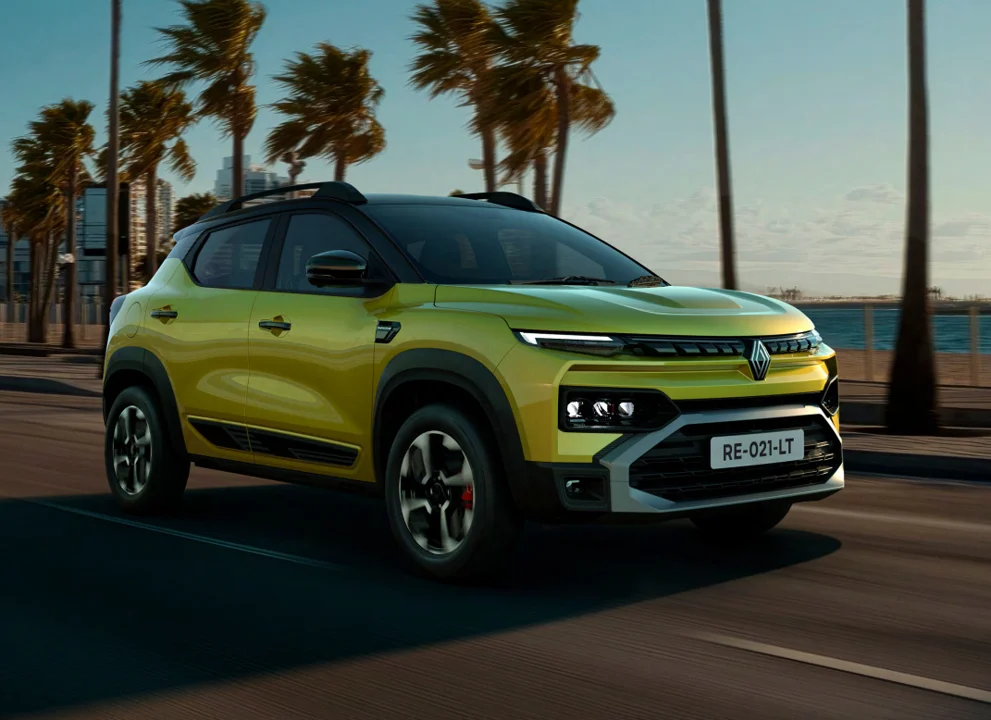What is the mileage of Renault Kiger?
The Renault Kiger offers different mileage figures depending on the fuel type and transmission. The manual petrol variant delivers up to 20 km/l, while the automatic petrol variant offers up to 19 km/l.


18 - 20 kmpl
Petrol Mileage
Manual
20 kmpl
Automatic
19 kmpl
Authentic
19 kmpl
Petrol • Manual
ARAI mileage
Monthly Fuel cost for 40km/day₹5,985
Evolution
19 kmpl
Petrol • Manual
ARAI mileage
Monthly Fuel cost for 40km/day₹5,985
Techno
19 kmpl
Petrol • Manual
ARAI mileage
Monthly Fuel cost for 40km/day₹5,985
Emotion
19 kmpl
Petrol • Manual
ARAI mileage
Monthly Fuel cost for 40km/day₹5,985
Emotion Turbo
20 kmpl
Petrol • Manual
ARAI mileage
Monthly Fuel cost for 40km/day₹5,686
Evolution AMT
19 kmpl
Petrol • Automatic
ARAI mileage
Monthly Fuel cost for 40km/day₹5,985
Techno AMT
19 kmpl
Petrol • Automatic
ARAI mileage
Monthly Fuel cost for 40km/day₹5,985
Techno Turbo CVT
18 kmpl
Petrol • Automatic
ARAI mileage
Monthly Fuel cost for 40km/day₹6,318
Emotion Turbo CVT
18 kmpl
Petrol • Automatic
ARAI mileage
Monthly Fuel cost for 40km/day₹6,318
Maintain your Renault Kiger in top-notch condition by regularly servicing the vehicle.
Be gentle with the accelerator pedal, and avoid sudden acceleration.
Maintain the optimum tyre pressure in your Renault Kiger.
Maintain your Renault Kiger in top-notch condition by regularly servicing the vehicle.
Be gentle with the accelerator pedal, and avoid sudden acceleration.
The Renault Kiger offers different mileage figures depending on the fuel type and transmission. The manual petrol variant delivers up to 20 km/l, while the automatic petrol variant offers up to 19 km/l.
The Renault Kiger delivers excellent fuel efficiency in city conditions. The manual petrol variant achieves up to 20 km/l, while the automatic petrol variant delivers up to 19 km/l under typical city driving conditions.
The Renault Kiger manual transmission offers up to 20 km/l, while the automatic transmission delivers up to 19 km/l. The difference is minimal, making both options fuel-efficient choices.
The mileage of Renault Kiger can be affected by various factors including driving conditions, traffic patterns, vehicle maintenance, tire pressure, and driving style. Under optimal conditions, you can achieve up to 20 km/l with manual transmission and 19 km/l with automatic transmission.
Yes, the Renault Kiger is quite fuel efficient. It delivers up to 20 km/l with manual transmission and 19 km/l with automatic transmission, making it an economical choice for daily commuting.
Discover. Decide. Drive.
Explore at your pace, with expert recommendations if needed. Finalise and book your car at the best price.
Financing the right way
Access the best loan options with hassle-free, paperless financing.
Prepare to drive
Schedule delivery for your special day and track updates effortlessly.Schedule delivery for your special day and track updates effortlessly.